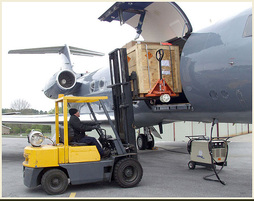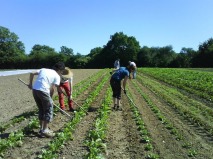In the 1940s while much of the world was emerging from food rationing, agricultural chemicals were promoted as, and indeed must have seemed, a wonder cure for the world's food shortages.
At the same time the organic pioneers and founders of the Soil Association, chose to resist the temptations of the quick chemical fix, prefering to implement scientific improvements and systems that worked with the soil and nature, rather than dominate or exploit it. They considered questions such as:
With hindsight, it's easy to see that they were right. 'Conventional' Agriculture is now returning to sound environmental stewardship techniques. We learnt the hard way that if we over-rely on chemical fertilisers we see soil erosion and in some parts of the world, encroaching desert.
We can now see that those early ecologists predictions were true. That we could be heading towards a silent spring. That we have seen a reduction in our wildflowers, our native bird populations, and bio-diversity. Not to mention the changing climate.
In the 1990s the Soil Association was also asking:
- What will happen to the living soil if its health and structure are no longer at the heart of your agricultural practice?
- What happens when all the waterways and our drinking water are polluted with chemicals?
- What happens when hedges are grubbed out in the name of production efficiency rather than environmental efficiency?
With hindsight, it's easy to see that they were right. 'Conventional' Agriculture is now returning to sound environmental stewardship techniques. We learnt the hard way that if we over-rely on chemical fertilisers we see soil erosion and in some parts of the world, encroaching desert.
We can now see that those early ecologists predictions were true. That we could be heading towards a silent spring. That we have seen a reduction in our wildflowers, our native bird populations, and bio-diversity. Not to mention the changing climate.
In the 1990s the Soil Association was also asking:
- What happens when our own local farmers and growers go bankrupt and sell up, to be replaced by cheap imports, shipped and airfreighted by the power and request of the supermarkets?
We've seen cheap food, all right, but at what cost?

We've seen increased food miles, carbon emissions, a reliance on imports and a consequent lack of self-sufficiency and future food security...which now worries us considerably, given our current concern of a global oil crisis. We've also seen a rise in obesity and health concerns derived from overeating. And a slimming product budget of $40 billion in the developed world--a sum similar to that estimated for the third world to eliminate malnutrition through improved but low input, organic agriculture. We've come a long way in 60 years but have we gone too far?
The organic movement is currently asking - and well it should:
- What happens when we have let loose into the ecosystem genetically modified materials?
Unfortunately we don't yet have the benefit of hindsight to know the answer to that.
The organic movement is not anti-science by any means. But it does base all decisions on its principles, rather than on the capitalist holy grails of profit, market efficiency, and economic growth.
It sees us as people, not consumers. We should grow food, not commodities for the financial City to gamble with at the expense of the poor. That communities needs are met rather than markets. From an organic perspective, there is no true wealth but life.
Buying local organic produce...
- reduces processing and packaging and cuts down on food miles, using less energy and reducing pollution.
- can offer a fair price to the producer and the consumer by selling direct.
- isn't anonymous--you know from whom and from where it comes.
- helps to keep farming sustainable and alive, based on trust and accountability.
We support the International Federation of Organic Agriculture Movements (IFOAM) organic principles of fairness, care, health, and ecology.

